On the outside looking in
Being a black athlete in a majority white sport
Photo courtesy Cristina Hilsenrath
Reuben Stoll carries the ball upfield in a spring lacrosse game against Einstein.
November 21, 2019
March 1, I sat in my government class anxiously waiting for the end of the day. When the clock struck 2:30 p.m., I was bouncing with excitement like every other Whitman lacrosse player. It was the first day of the season. I walked to the locker room, then to the field, visualizing the games to come, hoping each expectation would become a reality; dreams of beating Churchill and winning the division clouded my head. I was ecstatic to once again be surrounded by my teammates, my brothers.
Even though my teammates and I love the same game, something always feels a little different for me. While March brings a feeling of excitement for the new season. It also incites anxiety. I am the only person on the team of African American descent; it’s lonely and sometimes tense. The locker room always makes this more evident, more so sometimes than when our jerseys and pads are on.
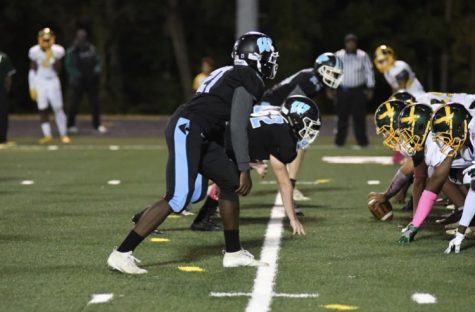
Solomon Adeoti lined up on the edge preparing to rush the Seneca valley Quarterback.
In the summer of eighth grade, I also played on a team where I was the only black player. In my whole lacrosse career, I have been on the same team with only five other black players in total. In my seven years of experience, it has also been unusual to play against another black athlete, even in a tournament with hundreds of participants.
When I was younger, I assumed it was just as normal for black athletes to play lacrosse as any other sport. But as I got older I realized that lacrosse is dominated by mostly affluent white players.
This is true for most sports in Bethesda and at Whitman specifically; 68.8% of the student body at Whitman is white while only 3.5% of students are black, according to Whitman’s school profile.
Each year, Whitman defensive end Soloman Adeoti and running back and punter Alante Dorsey wake up at 8:00 a.m.for their first day of Whitman football practice. They’re as giddy as I am on my first days, they said. The loneliness sets in when they’re on the field; they make up two of four black players on a team of 38.
“It definitely feels weird that I am one of the only black kids, and it’s very noticeable,” Adeoti said.
Though Adeoti felt that racially his experiences practicing with his teammates were uneventful, when he played against other teams, the differences were obvious.
“Players on other teams will call me out,” Adeoti said. “They will ask me if I’m the only black kid on the team in a joking fashion. After the game against WJ, some of the students found my Instagram and started directly messaging me because I was one of the only black kids on the team.”
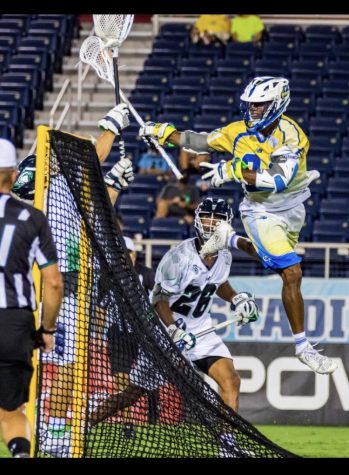
Chazz Woodson soars through the air dunking the ball near the goal in a professional game for the Florida Launch.
Adeoti was born in Livingston, New Jersey, then moved to Nigeria where his parents were originally from. In middle school, he moved again to England and went to boarding school there. There, Adeoti was a part of a more diverse group of students but now landing here at Whitman, he had to develop his own place in the community. He first moved to Bethesda three and a half years ago.
“I felt very lonely when I first came to Whitman,” Adeoti said. “It definitely felt weird being such a minority and hearing people use the N-word.”
We black minority athletes often have to walk a fine line. We’re held to different standards. We can’t stretch the rules because then you’ll stand out — then you’ll just be the “black kid.”
You don’t want to stand out, but it’s hard not to react when you face discrimation on the field. This summer, in a Whitman game, a white player on the opposite team who was white exclaimed, “these n—-s suck.” Though I felt upset, all I did was play the hardest I could and let the scoreboard show my emotions.
Racism isn’t just a couple of isolated incidents at high school; it takes place on the college field too.
In seventh grade, professional lacrosse player Mark Ellis picked up a lacrosse stick for the first time.
“I was always the most athletic kid in the sports I played,” Ellis said. “I grew up always playing football.”
Ellis is from a family with a lineage of Jamaican coal miners and has lived in New York for most of his life. He played lacrosse for Stony Brook University in his home state. In his senior year, Ellis transferred to play Hofstra University and he is now one of the strength and conditioning coaches for the school. He also currently plays professionally for the New York Lizards, the state’s professional lacrosse team.
When he first started playing lacrosse in middle school, he didn’t have any equipment on the first day of tryouts. He got everything from his coach, including the stick that would become so familiar to him.
“My friends convinced me to sign up for lacrosse, and they said I would be good at defense, so that’s what I did,” Ellis said. “My coach told me to practice ground balls, so when I went home, I practiced on the concrete and my stick ripped.”
He found that these small mistakes and growing pains were the problems of any new player, but as the only person of color on the field, the difference between Ellis and the others was again obvious.
“I didn’t know that there weren’t any black kids that played lacrosse,” he said. “As a kid my mom always told me to be different, and I definitely was.”
It wasn’t until he went to a prep school in Connecticut his senior year that he crossed sticks with another black player.
“I have definitely experienced some racist things on the field by other players,” Ellis said. “There is really nothing you can do about it. You just have to take it and let the scoreboard shove it in their face.”
Ellis was in high school playing in a summer league when he heard an opposing white player murmur, “Relax, n—a.”
“If I was called a ‘n—a,’ I wanted to make sure that I was the best n—a they’d ever seen play the game of lacrosse,” Ellis said.
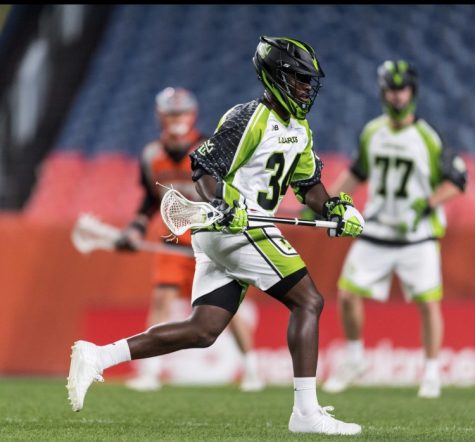
Mark Ellis runs downfield in a professional lacrosse game for the New York Lizards.
When Ellis was at Hofstra University, he experienced another racist incident on the field. As he was playing against Fairfield University, another player on Ellis’ team was called a n—-r.
“In the handshake line, I grabbed his jersey,” Ellis said. “My teammates stopped me from taking it too far.”
Just one state away, in Providence, Rhode Island, recently retired professional lacrosse player Chazz Woodson went through similar experiences at Brown University years ago.
Woodson was very young when he started playing lacrosse. He grew up around the game because his father was a coach. Woodson was raised in Norfolk, Virginia, and played lacrosse throughout his childhood. After graduating from Brown University, he had a long, decorated career and played lacrosse professionally from 2005 to 2017.
“It wasn’t really a big deal to me until I had the platform to impact others’ experiences,” Woodson said. “Part of that was cool to me: I’m doing something that not a lot of other people that look like me are doing.”
Woodson felt racism from both sides of the field, with one incident involving a teammate and another an opposing player.
“I was called a n—-r,” Woodson said. “Coming home from a game, it happened when I was leaving the locker room. I just kept moving.”
On the field, the same thing happened.
“I was very upset in the moment,” he said, “I had to pull myself off the field to calm down.”
At the start of each season, I remind myself of stories like theirs and of my own memories. I remind myself that I’m not alone when I hear the n-word get tossed around during games by white players and when I hear fans target me specifically because of my skin color. Yes, it has happened to me too. And if you play a sport and have any black teammates, it’s probably happened to them.
Racism in sports exists, and we have to do better as a community to first recognize that, and second, fix it. Everyday I wear the ‘One Whitman’ bracelet to remind myself that I have a great band of people behind me that will support me through anything I go through on or off the field. Hopefully, one day, I will be able to see all the fields populated with more black players.




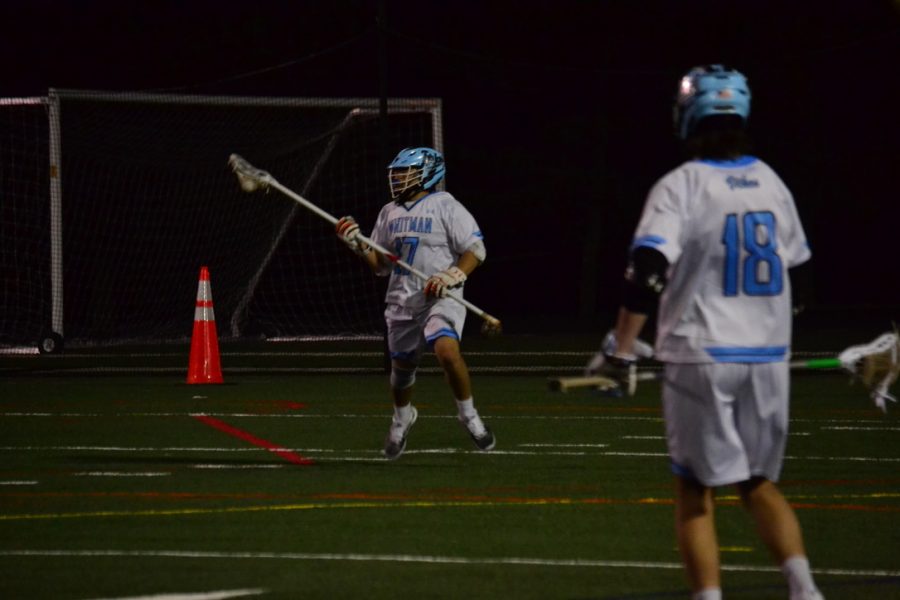
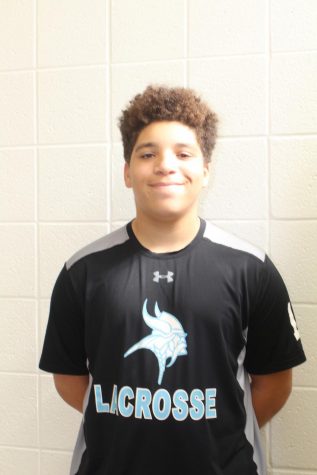






Cindi Jones • Dec 1, 2019 at 7:50 am
A very thoughtful and well-written article. I’ve always worried about my son and nephews in this sport. I’ve also wondered how the white player’s parents feel about the bad behavior from some of their sons. My boys love the sport. I’m glad we have an HBCU D-1 to represent the game! Go Hampton Pirates!
Coach • Nov 25, 2019 at 8:08 am
Great article! My son also plays lacrosse on the college level. It has definitely been a rough road. He plays attack so the ball was passed over his head more times than I count. Many times it seemed as though they would rather play a man down instead of passing him the ball. Even with adversity he still was one of the leading scorers on the team. It definitely builds character and tough skin. I hope you make it to the next level and good luck with your writing career!
Heather • Nov 24, 2019 at 1:26 pm
Excellent article! My son – a black lacrosse player – sent it to me. This article is very timely, as he is trying to decide whether or not he really DOES want to play lacrosse in college, partly for the reasons you state.
You are an excellent writer with great potential!
LaKisha Overton • Nov 24, 2019 at 12:40 pm
Excellent, excellent article young man!